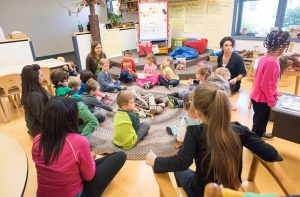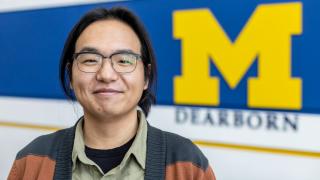
 Students participate in learning activities at the Early Childhood Education Center.
Students participate in learning activities at the Early Childhood Education Center.
State of Michigan officials said more people were needed to educate the increasing number of youth who are diagnosed with autism. The College of Education, Health, and Human Services (CEHHS) responded that they wanted to help in the effort—and was awarded $750,000 by the Michigan Department of Health and Human Services.
The funding, which is spread out over three years, will assist in starting the Center for Autism, a University of Michigan-Dearborn and Beaumont Health System partnership.
CEHHS Dean Janine Janosky said with nearly 18,000 students diagnosed with autism spectrum disorder (ASD) in 2011 and an estimated 50,000 Michigan residents with ASD, educators with experience with this special need are in demand.
“If you look at the prevalence and incidence for diagnosis of the autism spectrum disorder in Michigan, you see there is an increase in both. You also see there is a gap between the number of individuals prepared to work in that profession and the individuals being diagnosed,” she said. “So the college is here to work to fill that gap.”
The goal is to train at least 225 registered behavior technicians, which is a 90-day hands-on training program, during the three-year time period. In addition, the center will educate 25 board certified assistant behavior analysts (BCaBA) through a certificate program. Trainees will work with students ages 3 through 8 in a classroom setting.
The center—which will be housed in the building shared by UM-Dearborn’s Early Childhood Education Center and Beaumont’s Center for Exceptional Families (CEF)—is expected to open in Fall 2016. The CEF currently serves more than 2,400 children annually, with 444 with a presenting concern of ASD.
“The current collaboration between UM-Dearborn, through the Early Childhood Center within CEHHS and the Beaumont Health System’s Center for Exceptional Families, provides a unique opportunity for children and families to receive comprehensive, coordinated and culturally competent healthcare services for children with multiple disabilities, including autism spectrum disorder,” said UM-Dearborn Chancellor Daniel Little.
“Further, the outcomes of this initiative have the potential to impact children and families throughout the state of Michigan while it lends toward achieving the state’s goal of increasing the number of registered behavior technicians to 300.”
Beaumont Health Senior Vice President and Center for Exceptional Executive Director Maureen D’Agnostino said the partnership between the medical facility and college benefits more than those two organizations—it supports the community.
“University of Michigan-Dearborn will be educating our clinicians of the future who will practice their skill set to become leaders in the field of autism,” she said. “Together, we will fill a much needed void of experienced therapists who will then treat the growing epidemic of autism so these children can get the treatments that they deserve. When that happens, everyone wins.”


